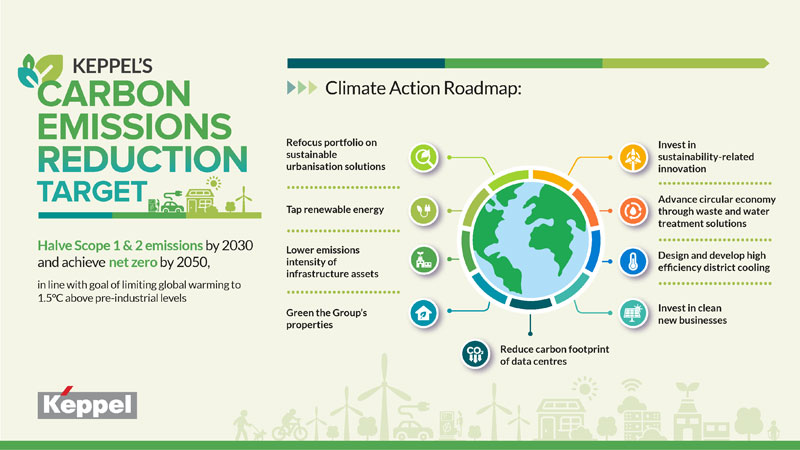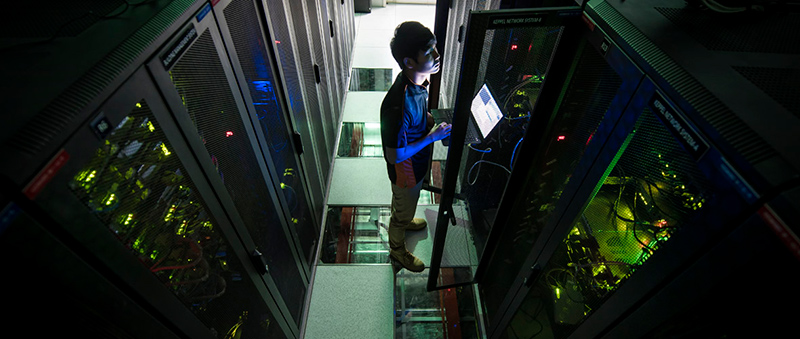Our focus areas
Keppel has a two-pronged sustainability strategy of running our business sustainably, and making sustainability our business by providing solutions that contribute to global sustainable development and decarbonisation efforts. We undertake a robust process to identify and prioritise our material environmental, social and governance issues.
- Climate Action and Environmental Management
- Corporate Governance and Risk Management
- Economic Contribution to Society
- Supply Chain Management
- Human Capital Management
- Health & Safety
- Community Development
- Enhance board diversity in terms of skills, experience, gender and age.
- Enhance sustainability governance.
- Continue to develop Risk Management and Compliance Framework to pro-actively mitigate and manage key risks and avoid regulatory issues.
- Implement technology and data analytics to support governance, risk and compliance processes.
- Continue to enhance climate change risk assessment and management in line with TCFD recommendations.

Keppel recognises that good corporate governance is essential to the sustainability of the Company’s businesses, and that non-compliance with laws and regulations may pose financial and reputational risks. We are committed to ensuring strong corporate governance and regulatory compliance, robust risk management, including of sustainability-related risks, as well as high standards of ethical business conduct, including zero tolerance for fraud, bribery, and corruption.
We have a Board Diversity Policy and are committed to board diversity in terms of skills, knowledge, experience and other aspects of diversity, such as gender, age, ethnicity and nationality.
We maintain clear, consistent and regular communication with Keppel’s shareholders and the investment community. Please refer to Keppel's Annual Reports for more details on our engagement of shareholders.
Keppel’s System of Management Controls
Keppel’s System of Management Controls (KSMC) outlines Keppel’s internal control and risk management processes and procedures. The KSMC comprises the Three-Lines Model to ensure the adequacy and effectiveness of Keppel’s system of internal controls and risk management.
Regulatory Compliance Framework
We are guided by our Core Values and Code of Conduct. We will do business the right way and comply with all applicable laws and regulations wherever we operate. We strive to deliver outstanding performance, whilst maintaining the highest ethical standards.
We are clear with our tone for regulatory compliance, which is consistently emphasised from the top and throughout all levels of the Company. We do not tolerate fraud, bribery, corruption or any violations of laws and regulations.
Our Regulatory Compliance Framework focuses on critical pillars covering the areas of culture; policies and procedures; training and communications; key compliance processes; compliance risk assessment, review and monitoring, and compliance resources.
Risk-centric culture
Keppel adopts a balanced approach to risk management to optimise business returns while considering their holistic impact on corporate sustainability. Managing risks is an integral part of the way in which we develop and execute our business strategies. It is grounded in our operating principles and belief that a balanced and holistic risk-reward methodology is the best approach. This applies to all aspects of our business, and in particular, our commitment to environmental, social and governance issues, and our ability to deliver long-term value for our stakeholders.
Mindsets and attitudes are key to effective risk management. Keppel fosters a risk-centric culture through several aspects: transparency and competency; training and communications; frameworks and values; process and methods; ownership and accountability; and leadership and governance. Directors and employees are provided with regular education in risk management.
- Halve Scope 1 and 2 carbon emissions by 2030, compared to 2020 levels, and achieve net zero by 2050.
- Progressively expand tracking of Scope 3 emissions to cover all relevant categories.
- Achieve water intensity reduction of 20% by 2030 from 2019 levels.
- Achieve waste intensity reduction target of 10% by 2030 from 2019 levels.
- Continue to assess the financial impact of physical and transition climate-related risks and opportunities on the Company in line with TCFD recommendations.

Keppel is committed to both running our business sustainably, and making sustainability our business through providing solutions that contribute to a greener world. This involves focusing our portfolio on sustainability-related solutions and innovations, building resilience against climate change risks, and seizing climate-related opportunities for growth. We are also committed to minimising our environmental impact by reducing greenhouse gas emissions, energy consumption, water consumption and waste generation, as well as preventing pollution and preserving biodiversity in our operations.

Keppel supports the Taskforce on Climate-related Financial Disclosures (TCFD), and has voluntarily incorporated its recommendations in our reporting framework since 2020 to better articulate climate-related risks and opportunities that have a financial impact on our business. Since 2020, Keppel has adopted an evolutionary shadow carbon pricing scheme to evaluate major investment decisions, in order to mitigate mid-to-long term climate-related risks, prepare for tougher climate legislation and higher carbon prices, and avoid stranded assets.
Our key business units are certified to the ISO 14001 Environmental Management Systems standard, which guides how we identify, manage, monitor and control environmental issues.
We disclose our performance in mitigating our environmental impact in our annual sustainability report.
We partner government agencies and industry leaders to build knowledge and foster innovation to mitigate the impact of climate change.
Emissions reduction targets
Keppel’s carbon reduction strategy is overseen by the Board Sustainability and Safety Committee and driven by the Management Executive Committee, which is chaired by the CEO of Keppel Ltd.
Keppel aims to halve its Scope 1 and 2 carbon emissions by 2030, compared to 2020 levels, and achieve net zero by 2050. The target is in line with the Paris Agreement’s goal to limit global temperature increase to 1.5°C compared to pre-industrial levels. Keppel has been tracking Scope 3 emissions since 2019 and is progressively expanding its coverage to include all 15 categories. We are also working with our supply chain and portfolio of investments to improve energy efficiency and reduce emissions wherever possible.
On top of the Company-wide carbon emissions reduction target, Keppel’s divisions are encouraged to pursue even higher standards wherever possible, in line with their respective sectoral contexts and unique capabilities.
Improving energy efficiency
Keppel’s energy efficiency initiatives include the optimisation of operations and processes; technological improvements, including the adoption of more sustainable building designs and materials; and the use of energy-efficient equipment and devices.
Managing water & waste
We continue to strengthen our water conservation efforts through initiatives like promoting water-saving practices, adopting water-efficient technologies and equipment as well as implementing process improvements. We have set a Company-wide water intensity reduction target of 20% by 2030 from 2019 levels.
All effluents are monitored, treated and discharged in accordance with relevant standards and limits in the countries of operation. Any non-conformances are immediately addressed and rectified. Appropriate earth control measures are utilised to ensure that discharged water contains a lower amount of total suspended solids than the legal allowable limits.
We strive to minimise waste generation as well as treat and dispose waste responsibly where other options are not practicable. Waste is segregated at our offices, plants and yards to promote reuse and recycling. Keppel has set a waste intensity reduction target of 10% by 2030 from its 2019 baseline. Hazardous waste generated is handled, stored and disposed in a manner that adheres to best practices and meets local regulatory requirements. Since 2020, we have tracked data on hazardous waste generated in line with our goal of reducing such waste.

Keppel creates value for all stakeholders through running a successful and resilient business. Our business provides good dividends for shareholders, jobs for communities, opportunities for suppliers, products and services for customers, and tax revenue for governments. By growing our business as a provider of sustainability-related solutions, Keppel contributes to the economic advancement of society, while also advancing environmental sustainability.
Keppel is also committed to ensuring that its approach towards tax management is executed responsibly and with integrity.
- Screen 100% of new suppliers in accordance with ESG criteria.
- To have 100% of qualified suppliers endorse the Keppel Supplier Code of Conduct.
- Expand the assessments of supplier performance in relation to topics covered in the Keppel Supplier Code of Conduct.

Keppel believes in building a resilient, responsible, and diversified supply chain. We are committed to integrating sustainability criteria in the selection, monitoring and evaluation of suppliers and engaging with suppliers to adopt sustainable and responsible business practices, to minimise social and environmental impacts as well as manage risks across our supply chains.
We contract Singapore and overseas suppliers for our different lines of businesses. We recognise the importance of supply chain risk management and sustainable procurement in building operational resilience.
Key priorities of our supply chain management strategy include cost optimisation, product quality, track record of suppliers, supplier diversification, as well as alignment to ESG criteria and ethical practices set out in Keppel’s Supplier Code of Conduct.
We adhere to local content requirements and are committed towards strengthening our base of local suppliers in countries where we operate. In doing so, we support domestic economic growth and workforce capacity building.
We are also progressively expanding our tracking of Scope 3 emissions generated by our supply chain, and are working with our suppliers and portfolio of investments to improve energy efficiency and reduce emissions where possible.
Identification of significant suppliers
Identifying and auditing high ESG-risk significant suppliers enables us to better focus our efforts on improving sustainability practices and performance in our supply chain. Significant suppliers are determined by factors including cumulative order value and volume, single order value and volume, as well as business criteria such as component criticality and substitutability of products or services. ESG risks are assessed based on a country risk perspective in areas such as human rights, corruption, and the country’s environmental regulatory framework.
Screening new suppliers
All suppliers are qualified in accordance with our requisition and purchasing policies, and screened based on ESG criteria. We review potential suppliers’ industry reputation, financial performance, security practices, and certifications, with a preference for suppliers with certifications for ISO 9001 Quality Management System, ISO 14001 Environmental Management System, OHSAS 18001 Occupational Health & Safety assessment series or ISO 45001 Occupational Health and Safety Management System or equivalent. We evaluate suppliers’ track records on issues such as child labour, forced labour, freedom of association, equal opportunity and fair compensation.
All qualified suppliers are expected to sign and abide by the Keppel Supplier Code of Conduct. All levels of the Company are required to include the acknowledgment and signing of the code, which is available in multiple languages, as part of their supplier selection procedure.
Due diligence, risk assessment and mitigation
The assessment of supplier risks and due diligence measures undertaken by Keppel is an ongoing process which takes place throughout the lifecycle of the buyer-supplier relationship.
We have developed an audit framework since 2019 to manage sustainability risks among our significant suppliers. We are working to further improve our supplier due diligence processes, such as leveraging existing control processes to conduct internal or second party ESG audits on suppliers, and using third party ESG rating agencies to assess, monitor and manage suppliers’ sustainability performance.
- Execute our Zero Fatality Strategy and achieve zero workplace fatalities.
- Continue to strengthen culture for workforce to feel empowered to speak up for safety.
- Operate workplaces that are safe, productive and smart, leveraging Safety 4.0 technologies and digital innovation.

Keppel is committed to providing a safe and healthy working environment. We believe in a pro-active safety culture and advocate for continuous improvements in health and safety standards, both in our operations and in the broader community. We also ensure high safety standards for our products and services to safeguard customer health and safety.
Safety is a core value at Keppel. It is an integral part of our business, and a key focus area for our Board of Directors and senior management. We report on our safety performance in our annual Sustainability Report.
We focus on strengthening our frameworks and management systems as well as promoting a culture of HSE ownership across our operations. We are committed to continually improving our HSE performance by setting and reviewing targets, as well as monitoring and evaluating progress through performance management and audits.
In 2006, Keppel was the first publicly listed company in Singapore to establish a Board Safety Committee (BSC), which adopted a hands-on approach in setting the strategic direction and establishing a HSE framework to ensure that consistently high standards were maintained across our business units. With effect from 1 May 2022, the role of the BSC was subsumed under the terms of reference of the Board Sustainability and Safety Committee (BSSC).
Managing safety
Our approach to safety management is guided by the Keppel Zero Fatality Strategy. Introduced in 2016, the strategy outlines actionable items to reduce workplace fatalities to zero through five strategic thrusts: building a high-performance safety culture, adopting a proactive approach to safety management, leveraging technology to mitigate safety risks, harmonising global safety practices and competency, and streamlining learning from incidents.
All employees and contractors at the worksites where Keppel has operational control are covered by our HSE management systems. All employees and third-party suppliers and contractors are also expected to abide by the Keppel HSE policy which places the highest priority on the health and safety of people and the protection of assets and the environment.
Hazard identification & risk assessment
Across the Company, we establish and implement procedures to identify, assess and mitigate safety and health hazards that are linked to our operations.
As part of hazard identification and risk management, and to monitor progress against our targets, our operational and safety teams conduct periodic workplace inspections and internal audits. Union workers and subcontractor representatives are invited to participate in meetings where the identification of hazards, assessment of risks and the application of control measures are discussed. For business units whose workers do not belong to unions, worker representatives are nominated by the various departments to participate in HSE committee meetings.
We are also leveraging technology through the GoArc Artificial Intelligence-powered cloud-based platform to record HSE processes, such as hazards reporting, HSE inspections and audits, as well as permit-to-work applications. The integrated platform provides in-depth predictive analyses to eliminate or reduce risks involved in operations and improve the safety awareness of stakeholders. In addition, we are collaborating with partners on the software and hardware of a smart wearables initiative to improve workforce safety and productivity.
Incident Reporting & Investigation
Keppel's divisions are required to report and investigate all incidents and near misses, and ensure that lessons learnt are shared to prevent recurrence. All companies where Keppel has operational control are required to report incidents, including those that involve third parties such as contractors, clients and visitors at our premises, as well as employees working at third-party sites or commuting for work-related purposes.
At worksites, safety time-outs are conducted immediately after an incident occurs to heighten awareness among the involved work groups.
Keppel also has procedures in place to monitor and investigate any occurrences of occupational disease at individual sites based on the region’s regulatory requirements, and implement programmes to reduce such occurrences.
Building skillsets
We empower and train our stakeholders to ensure that all personnel are kept updated on safety measures and best practices. All workers must undergo High Impact Risk Activities (HIRA) training which covers high-risk activities specific to each work site. Training is conducted to equip HSE personnel with the skills to effectively manage safety risks.
Influencing our supply chain
We work closely with all stakeholders, including our contractors and subcontractors, to maintain high safety standards throughout our workforce. Our subcontract workers undergo the same safety training as direct employees.
To collectively raise industry standards and best practices, members of Keppel’s management and HSE representatives are members of various committees of the Workplace Safety and Health Council.
- Conduct engagement surveys to track and enhance employee engagement.
- Continue to promote diversity, equity and inclusion in the workplace.
- Build an agile and collaborative workforce, with experience across divisions and geographies, to propel the Company towards its Vision 2030 goals.
- Strengthen people capabilities through driving a proactive learning culture and growing digital readiness.

Keppel recognises that our people are fundamental to strong performance. We seek to build a highly trained workforce led by people-centric leaders. We are committed to building positive employee well-being, upholding fair employment practices, and empowering a diverse and engaged workforce.
Together with our stakeholders, we strive to build a Keppel for all, where employees feel valued, respected and engaged.
Fair employment policies & practices
We adopt fair employment practices and comply with local labour regulations across our global operations, as well as minimum wage laws, where such laws apply. We believe that hiring from local communities enhances our ability to understand local needs and strengthens our capabilities on the ground. We also develop talents locally to assume management positions.
All our business platforms in Singapore have signed the Employers’ Pledge of Fair Employment Practices by the Singapore Tripartite Alliance for Fair & Progressive Employment Practices. Keppel is also a signatory of the Singapore Business Federation’s Sustainable Employment Pledge.
Human rights
We uphold and respect the fundamental principles set out in the United Nations (UN) Universal Declaration of Human Rights and the International Labour Organisation’s declaration on fundamental principles and rights at work. Our approach to human rights is informed and guided by general concepts from the UN Guiding Principles on Business and Human Rights.
Our commitment to human rights is supported by our Employee Code of Conduct, which explains Keppel’s stance against discrimination on any basis. Keppel also supports the elimination of any exploitative labour through its policies, planning and administration of employment practices.
Keppel’s whistle-blower reporting channel, which is available publicly online, is widely communicated and made accessible to all stakeholders.
Diversity, Equity & Inclusion
We believe that people should have access to opportunities regardless of age, gender, ethnicity, nationality, religion, marital status, pregnancy status, caregiving responsibilities, mental health conditions or disability. Our stance on diversity and inclusion is articulated in our Global Diversity, Equity & Inclusion Policy.
Our hiring policies ensure equal employment opportunities for all, and our recruitment processes are designed to foster equality.
Training and Talent Development
To enable employees to develop and refine their skills and competencies, we customise learning and development programmes across Keppel to cater to different career stages and industry needs.
Employees are provided with equal opportunities to be considered for learning and development based on their strengths and needs to help them achieve their full potential.
- Continue to encourage staff volunteerism worldwide.
- Support programmes aligned with Keppel’s goals of caring for the underprivileged, supporting education and protecting the environment.
- Leverage Keppel's diverse capabilities to contribute to communities where we operate.
- Contribute to nature-based solutions to fight climate change with the planting of 10,000 trees in Singapore over five years (2021-2025).
- Drive collaboration with organisations that share our commitment to have a positive impact on our communities.
Keppel believes that the Company does well when the community does well. We aim to uplift and give back to communities wherever we operate, building lasting positive relationships and effective partnerships, including through staff volunteerism. We commit up to 1% of our net profit to worthy causes that resonate with the Company’s values. These include caring for the underprivileged, empowering lives through education, protecting the environment, and nurturing creativity and an appreciation for the arts among children and youths.
We disclose the impact of our community investments in our annual Sustainability Report.
Keppel Care Foundation
In Singapore, contributions to Institutions of a Public Character (IPCs) are coordinated and disbursed by Keppel Care Foundation, Keppel’s philanthropic arm, which is governed by its own Board of Directors. The Foundation has disbursed over $52 million to worthy causes to date since its launch in 2012.
Keppel Volunteers
We encourage our employees to be responsible citizens. Employee volunteerism is a key thrust of the Keppel's community engagement programme.
Across the Company, employees are given up to two days of paid volunteerism leave each year to participate in activities organised by Keppel Volunteers, a Company-wide volunteer body. Since its inception in 2000, Keppel Volunteers has harnessed the Company's diverse resources, strengths and talents in spearheading regular activities that make meaningful contributions to local communities, social institutions and non-profit organisations.
